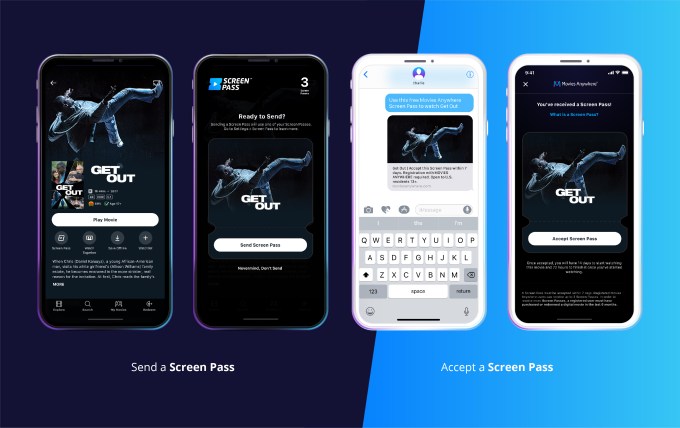I was recently part of an open forum about being Black in America, as well as in the startup space.
A white founder asked, “What can I do as the founder of a very early-stage startup?” The group gave various suggestions that included the obvious (or at least I would hope it’s obvious), “When you are growing your team, consider hiring Black team members,” or “When you are considering an investment from an investor, press them about the diversity of their current portfolio founders.”
But one suggestion really stood out, which was to make a concerted effort to find someone different from your current team’s makeup when bringing in subject matter experts. This intentional act shows your homogeneous team members that Black people, other racial minorities or genders can be experts too. It can also be applied when growing your team by making sure you interview diverse candidates whose level of expertise is often second-guessed.
This got me thinking about VC Monique Woodard’s statement that “Black founders are often overmentored and underinvested.” In June, at the height of the Black Lives Matter protests and open dialogue about anti-Blackness, we saw a slew of investors rushing to offer mentorship to Black founders. Some of the investors don’t have Black founders among their portfolio companies so to some onlookers, this rush to help Black founders was seen as insincere and a marketing ploy.
As a former founder, I can confidently say that most Black founders simply want a fair shot at presenting their startups to investors. The prevailing system of needing a warm introduction to access investors puts founders, especially Black founders, who don’t have the same networks as investors at a disadvantage. The proper mea culpa by these investors should be to make pitching more accessible for all founders. Although offers of mentorship are certainly welcome, the constant barriers Black founders tell me they struggle with are access to capital and networks, not a lack of talent or business savvy.
The quick emphasis on mentorship made me ask myself: How are the contributions of Black people (founders, investors, operators, etc.) to the startup space seen? Are we showcased as experts or as perpetual students in need of mentoring and advising? To directionally answer this question, I turned to podcasts. According to a New York Times article, “more than half the people in the United States have listened to one (podcast), and nearly one out of three people listen to at least one podcast every month.” This figure shows that podcasts are a wide-reaching medium that audiences use as a source of both entertainment and information.
I dug into the 2018 and 2019 guest lists of three of my favorite startup-related podcasts: “This Week In Startups,” “How I Built This With Guy Raz” and “The Twenty Minute VC.” These are all top-ranked podcasts with tens of millions in downloads and over half a million subscribers.
| Podcast | Description | Typical Guest Profile |
| This Week In Startups | Entrepreneur and angel investor Jason Calacanis brings you his take on the best, worst and most interesting stories from the world of startups. Glimpse into the boardroom during deep-dive interviews with the most innovative founders and investors. Get the experts’ hottest takes on trending topics during our news roundtables. |
|
| How I Built This with Guy Raz | Guy Raz dives into the stories behind some of the world’s best-known companies. How I Built This weaves a narrative about innovators, entrepreneurs and idealists — and the movements they built. |
|
| The Twenty Minute VC | The Twenty Minute VC takes you inside the world of venture capital, startup funding and the pitch. Discover how you can attain funding for your business by listening to what the most prominent investors are directly looking for in startups, providing easily actionable tips and tricks that can be put in place to increase your chances of getting funded. |
|
I analyzed more than 500 episodes that were aired in 2018 and 2019 across all three podcasts to get a racial and gender breakdown of guests that were featured on those episodes.
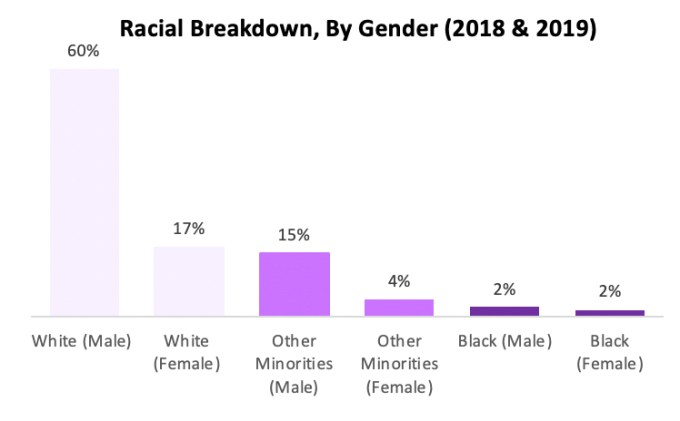
Image Credits: Kofi Ampadu (opens in a new window)
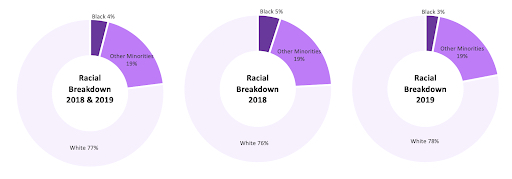
Image Credits: Kofi Ampadu (opens in a new window)
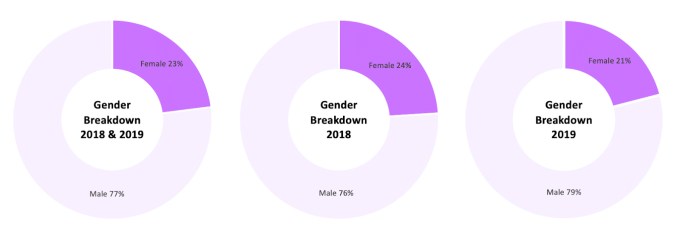
Image Credits: Kofi Ampadu (opens in a new window)
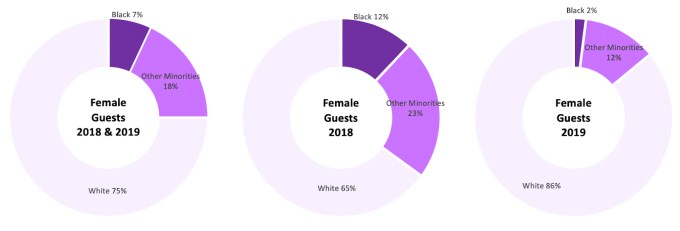
Image Credits: Kofi Ampadu (opens in a new window)
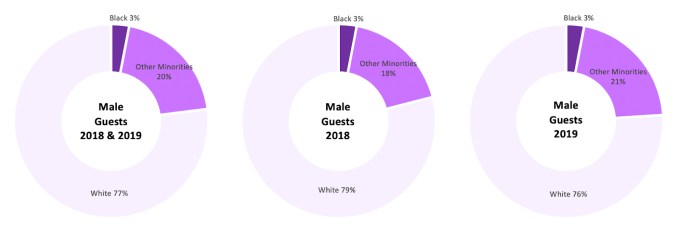
Image Credits: Kofi Ampadu
Not surprisingly, a majority of the guests featured were white men (60%). Black men and women were featured on 4% of all the episodes. A total of 15 Black (nine men and six women) unique guests were showcased as guests out of more than 400 unique guests during the two-year span. Also interesting to note that of those 15 Black guests, three were celebrities (a comedian, a TV personality and a rapper), two of whom were featured twice.
There are certainly more than 15 Black noncelebrities available who would fit the ideal guest lists of these podcasts. It is also interesting to note the percentage of Black guests decreased by 2% from 2018 to 2019 and incidentally increased by 2% for white guests during that span. The percentage of Black female guests within the female gender pool drastically decreased by 10% while white female guests increased by 21% in the two-year time period.
Conclusion
The results are a microcosm of what has been happening in the startup ecosystem: Black minds are undervalued and underappreciated. Oftentimes in the startup space, a founder is deemed a successful founder not based on how much money they collect from satisfied customers but by how much money they have raised from investors. Based on these misleading standards, Black founders will rarely be classified as successful because 1% of VC-backed founders are Black.
When it comes to the investor ranks, 81% of venture funds have no Black investors, so very often Black investors have to raise their own funds since the path to joining one is limited. Given these and other obstacles, I would argue Black people are the inspirational and relatable experts whose stories and advice need to be heard by wider audiences.
It is also worth noting that Black people are versed in varying topics and should not be exclusively invited on platforms to speak on Black issues. Black people are not a monolith and each person has their own passion and areas of expertise and outside of lived experiences not all Black people may be well-equipped to dissect Black issues.
In the spirit of not only pointing out systemic racism in the startup space, here is a list of emerging Black founders, investors and startup ecosystem builders, curated by Denisha Kuhlor and me. The talented people listed would make great guests for podcasts, conferences and any platforms that aim to amplify a diverse set of insights and experiences.
Methodology: Analyzed 484 guests across all three podcasts, the hosts of these podcasts were not included in the analysis as guests. As a result, podcast episodes that only included the host were excluded. Reaired podcast episodes were included in the analysis. If an episode had multiple guests, each guest was accounted for separately in the analysis.
The gender of guests was based on pronouns used to refer to guests on the podcast or publicly available information. The race of guests was objectively determined based on how the guest identifies or subjectively determined based on photographs, videos and publicly available information. The “Other Minorities” grouping includes Latinx, Southeast Asian and East Asian guests.
Disclaimer: This write-up is by no means written to cast aspersions on the three podcasts analyzed. They were simply chosen because I am an avid listener and they are all relatively popular in the startup space.

